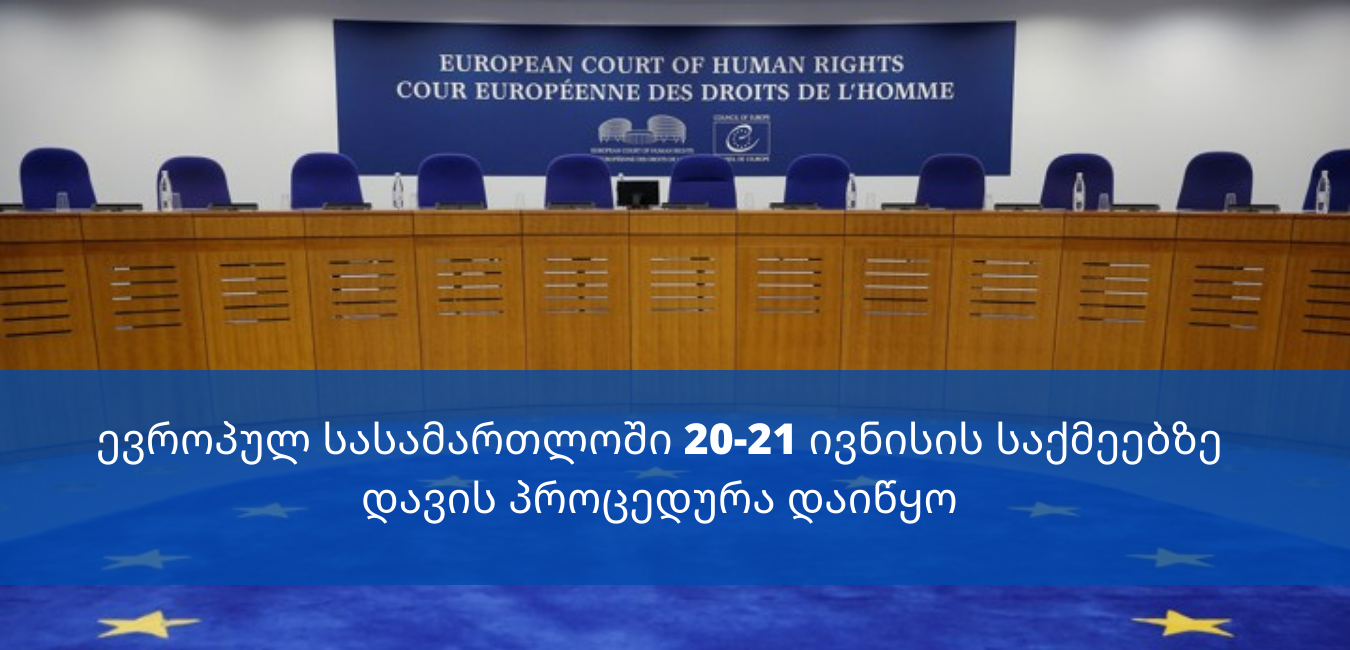


On September 16, 2021, the dispute procedure in the cases of June 20-21 events in the European Court began; in particular, the European Court set a deadline for the Government of Georgia to submit a position on the cases of June 20-21.
As it is known to the public, GYLA and EHRAC has filed applications with the European Court on April 7, 2021 on behalf of the 22 victims of the June 20-21 events, and the court notified the Government of Georgia of the applications on June 7, 2021.
Following the existing procedures, the Government of Georgia is obliged to answer the questions asked by the Court regarding the submitted applications by December 9, 2021. In addition, since the Court granted the request of GYLA and EHRAC, the state is also obliged to submit the materials of the criminal case launched by the Prosecution Service in connection with the dispersal of the rally on June 20-21, 2019. It should be noted that despite numerous requests from GYLA lawyers at the national level, the Office of the Prosecutor General does not allow victims to get familiarized with the complete materials of the criminal case, thus significantly restricting their procedural rights.
In the position to be submitted by December 9, 2021, the state on the cases: Tamar Baghashvili and others v. Georgia; and, Davit Kurdovanidze and others v. Georgia, should answer the following questions posed by the European Court:
1. In the light of the evidence presented by the applicants, were they have been subjected to inhuman and degrading treatment by the police during the dispersal of the June 20-21 rally? Did the use of rubber bullets comply with the law? Was the manner of application of the relevant provisions of domestic law in the current case compatible with Article 3 of the European Convention?
2. Did the investigative bodies carry out an effective investigation into the alleged ill-treatment of the applicants during the dispersal of the protest rally, as required by Article 3 of the Convention? What is the current state of the investigation? Were the applicants given an opportunity to participate effectively in the investigation process?
3. Having regard to the applicant journalists' allegation that the police used force against them while they were reporting the events as journalists, has there been an interference with their right to freedom of expression, within the meaning of Article 10 (1) of the European Convention? If so, was that interference prescribed by law and “necessary in a democratic society” in terms of Article 10 (2) of the Convention?
4. Has there been an interference with the applicant demonstrators' right to freedom of assembly under Article 11 (1) of the European Convention? If the interference took place, was it prescribed by law and "necessary in a democratic society" for the purposes of Article 11 (2) of the Convention?
5. Did the applicants have at their disposal effective domestic remedies under Articles 3, 10 and 11 of the European Convention as required by Article 13 of the European Convention?
According to the court procedure, after the state presents its position on the questions raised, GYLA will additionally submit a written argument to the European Court on behalf of its clients.
ჯ. კახიძის #15, თბილისი, საქართველო, 0102 ; ტელ: (995 32) 95 23 53; ფაქსი: (995 32) 92 32 11; ელ-ფოსტა: gyla@gyla.ge; www.gyla.ge
15, J. Kakhidze str. 0102, Tbilisi, Georgia. Tel: (995 32) 95 23 53; Fax: (995 32) 92 32 11; E-mail: gyla@gyla.ge; www.gyla.ge